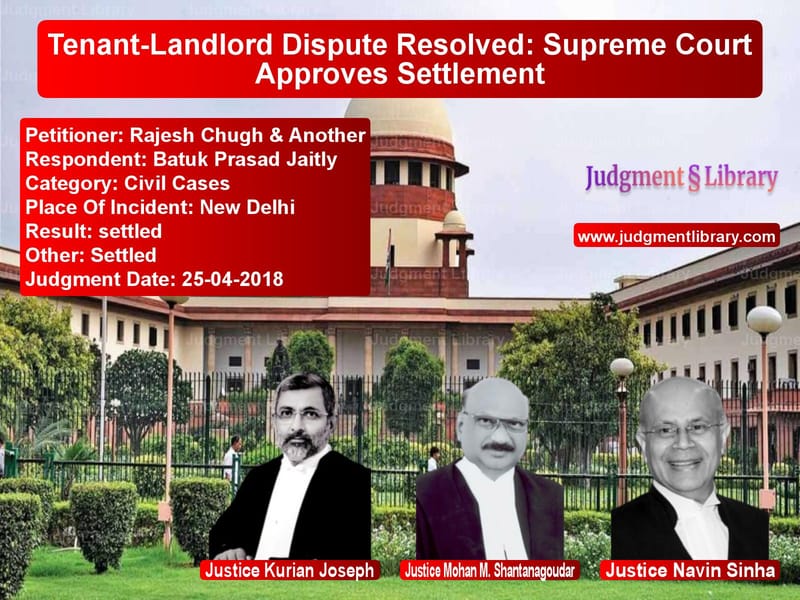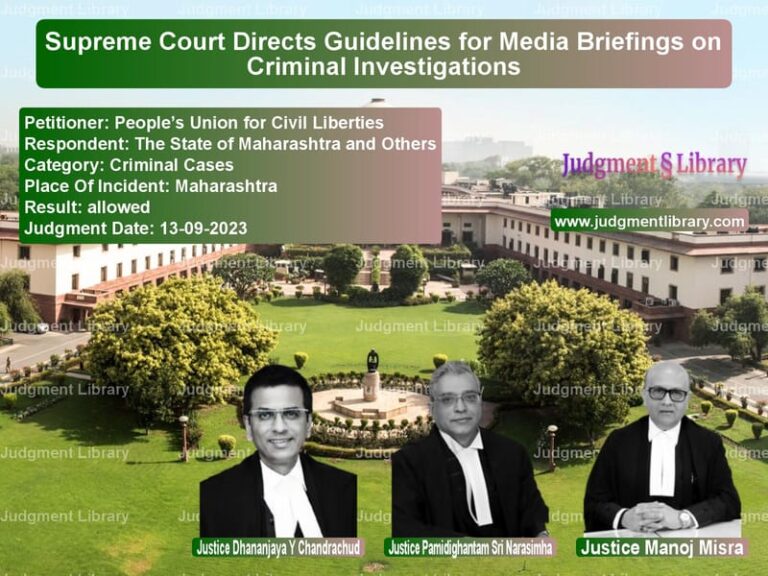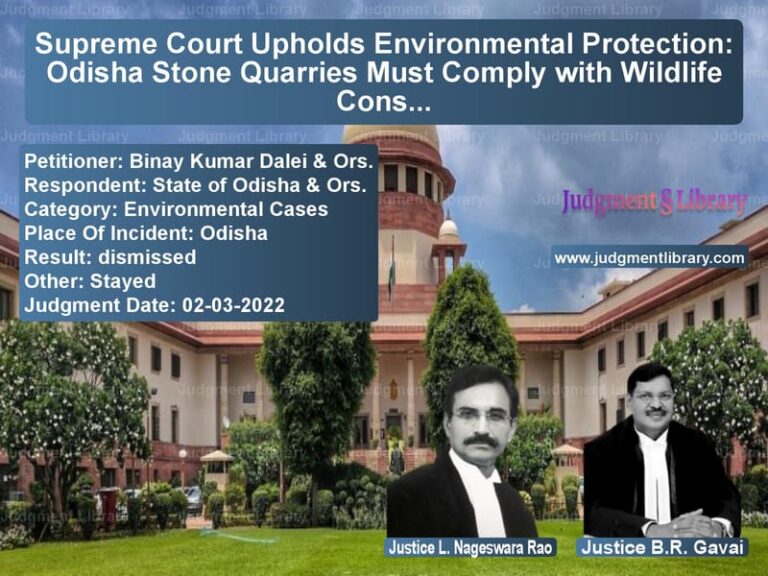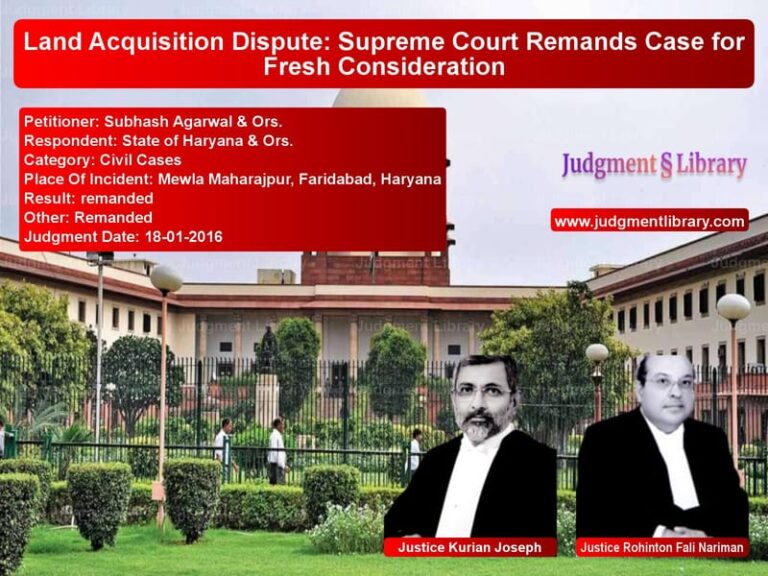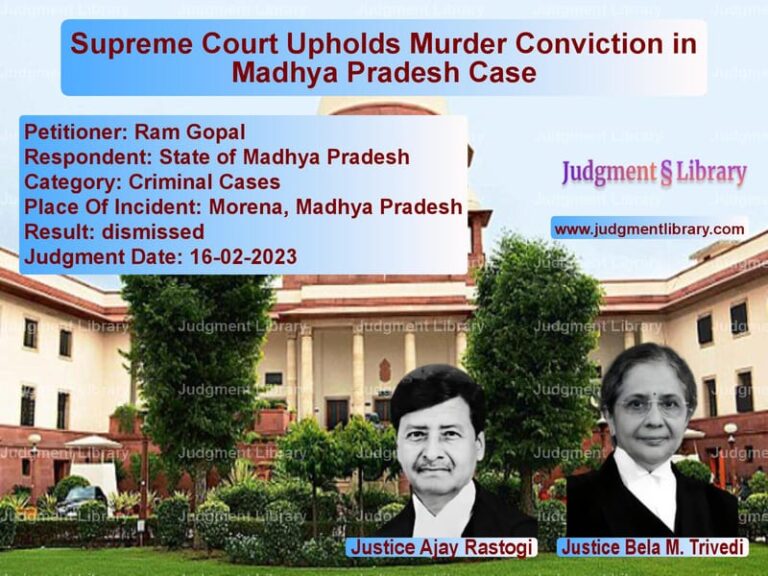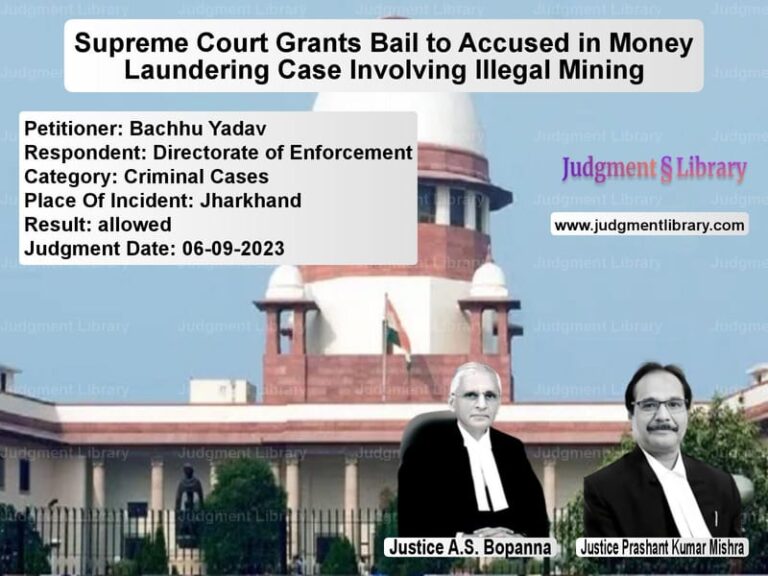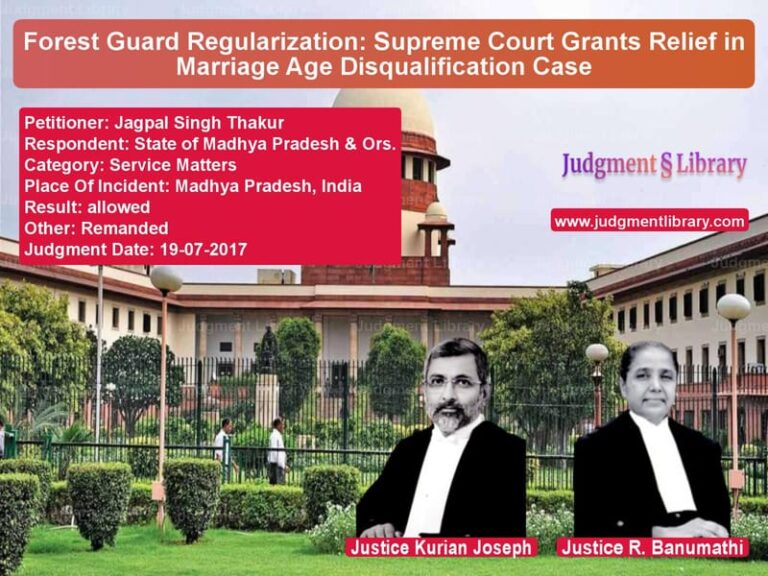Tenant-Landlord Dispute Resolved: Supreme Court Approves Settlement
Property disputes between landlords and tenants are a common occurrence in India, often leading to prolonged legal battles. One such case, Rajesh Chugh & Another vs. Batuk Prasad Jaitly, reached the Supreme Court after a prolonged tenancy dispute. The tenants, who had been running a bookshop in a small 33 sq. ft. premises in New Delhi, challenged the order passed by the Rent Controller. However, during the proceedings before the Supreme Court, the parties reached an amicable settlement, bringing an end to the litigation.
The Supreme Court’s judgment, dated April 25, 2018, formally recognized the terms of the settlement and directed both parties to comply with its conditions. This case underscores the importance of out-of-court settlements in reducing legal burdens and ensuring fair resolutions for both landlords and tenants.
Background of the Case
The case pertained to a tenancy dispute concerning a small bookshop located in a two-storeyed building at Nai Sarak, New Delhi. The tenants, who had been occupying the premises for several years, were ordered by the Rent Controller to vacate the property. Aggrieved by this decision, the tenants filed an appeal before the Supreme Court.
During the pendency of the appeal, both parties engaged in negotiations and reached a mutual agreement, leading to the signing of a Memorandum of Settlement on April 25, 2018. The Supreme Court took this agreement on record and disposed of the appeal accordingly.
Legal Issues Considered
The key legal issue in this case was:
- Whether the eviction order passed by the Rent Controller was justified, or whether the tenants had a legitimate claim to continue occupying the premises.
Arguments by Both Parties
Petitioner’s Argument (Rajesh Chugh & Another – Tenants):
- The eviction order passed by the Rent Controller was harsh and did not take into account their long-standing business at the premises.
- They sought either permission to continue their tenancy or a fair settlement that would compensate them for vacating the property.
- The premises was their primary source of livelihood, and immediate eviction would cause financial hardship.
Respondent’s Argument (Batuk Prasad Jaitly – Landlord):
- The eviction was legally valid as per the provisions of the tenancy laws.
- The property was needed for personal or other use, making it necessary for the tenants to vacate.
- The landlord was willing to reach a fair monetary settlement to compensate the tenants for their relocation.
Supreme Court’s Observations
The Supreme Court, led by Justices Kurian Joseph, Mohan M. Shantanagoudar, and Navin Sinha, took note of the amicable resolution reached between the parties.
Key Excerpt from the Supreme Court Judgment:
“During the pendency of the appeal before this Court, the parties have entered into a Memorandum of Settlement. The said Memorandum of Settlement dated 25.04.2018, duly signed by the parties and their respective counsel, is taken on record.”
The Court emphasized the importance of honoring the terms of the agreement and directed:
“The parties are directed to strictly abide by the terms of the Settlement, failing which they shall be liable to be proceeded against under the contempt jurisdiction of this Court.”
Terms of Settlement
According to the Memorandum of Settlement, the parties agreed to the following terms:
- The tenants agreed to vacate the premises at V-884, Nai Sarak Main Road, Delhi-110006, by August 31, 2018.
- The tenants were prohibited from creating any third-party rights in the said property.
- The landlord agreed to pay the tenants a compensation amount of Rs. 20 lakh upon handing over physical possession of the premises.
Judicial Precedents Considered
The Supreme Court recognized that tenancy disputes often become lengthy and contentious. In previous cases, the Court has encouraged amicable settlements to ensure that both landlords and tenants receive fair treatment. The resolution in this case aligned with the Court’s approach of facilitating voluntary settlements rather than imposing prolonged legal battles.
Final Verdict
The Supreme Court ruled:
- The appeal was disposed of in terms of the Memorandum of Settlement.
- The parties were required to adhere strictly to the terms of the agreement.
- Failure to comply with the settlement terms could result in contempt proceedings.
- No costs were imposed on either party.
Conclusion
This case highlights the significance of alternative dispute resolution mechanisms in tenancy disputes. By reaching a mutual settlement, the parties avoided further litigation and ensured a fair resolution. The Supreme Court’s endorsement of the agreement reinforced the importance of honoring settlements and provided a clear legal precedent for similar cases.
The ruling demonstrates how courts can play a proactive role in facilitating negotiations and ensuring that both landlords and tenants receive equitable treatment. By upholding the settlement, the Supreme Court reaffirmed the principle that litigation should not be prolonged when amicable solutions are possible.
Petitioner Name: Rajesh Chugh & Another.Respondent Name: Batuk Prasad Jaitly.Judgment By: Justice Kurian Joseph, Justice Mohan M. Shantanagoudar, Justice Navin Sinha.Place Of Incident: New Delhi.Judgment Date: 25-04-2018.
Don’t miss out on the full details! Download the complete judgment in PDF format below and gain valuable insights instantly!
Download Judgment: Rajesh Chugh & Anoth vs Batuk Prasad Jaitly Supreme Court of India Judgment Dated 25-04-2018.pdf
Direct Downlaod Judgment: Direct downlaod this Judgment
See all petitions in Property Disputes
See all petitions in Settlement Agreements
See all petitions in Landlord-Tenant Disputes
See all petitions in Judgment by Kurian Joseph
See all petitions in Judgment by Mohan M. Shantanagoudar
See all petitions in Judgment by Navin Sinha
See all petitions in settled
See all petitions in settled
See all petitions in supreme court of India judgments April 2018
See all petitions in 2018 judgments
See all posts in Civil Cases Category
See all allowed petitions in Civil Cases Category
See all Dismissed petitions in Civil Cases Category
See all partially allowed petitions in Civil Cases Category

